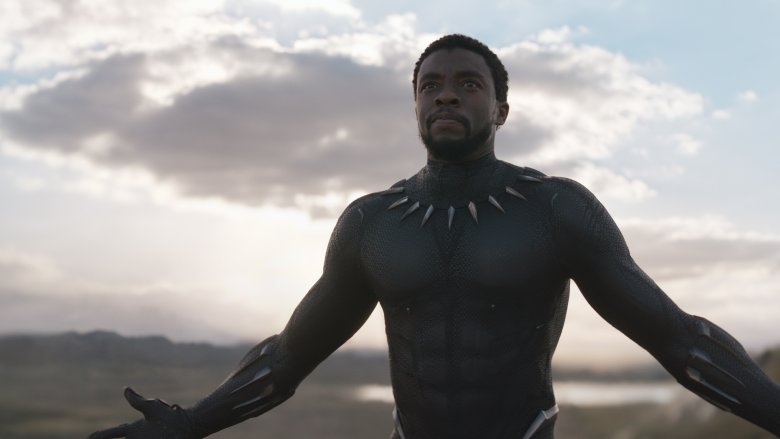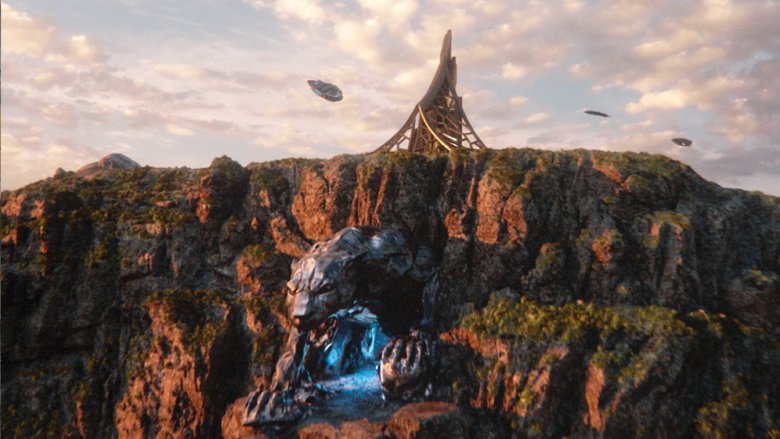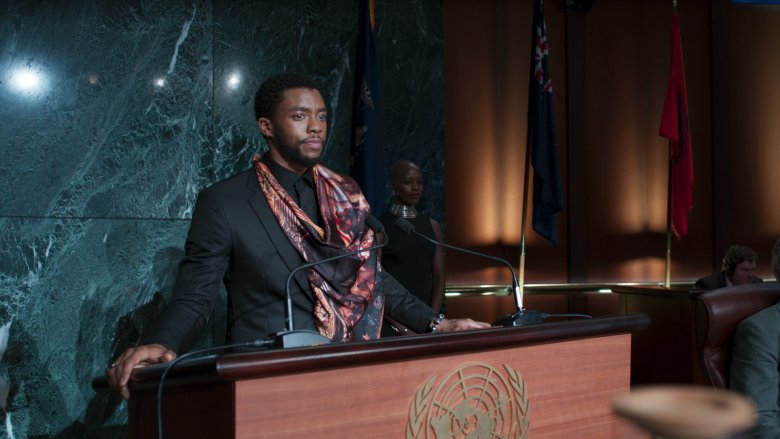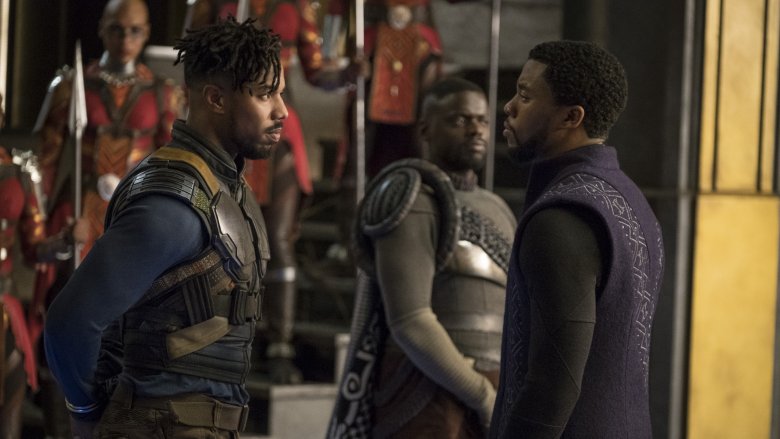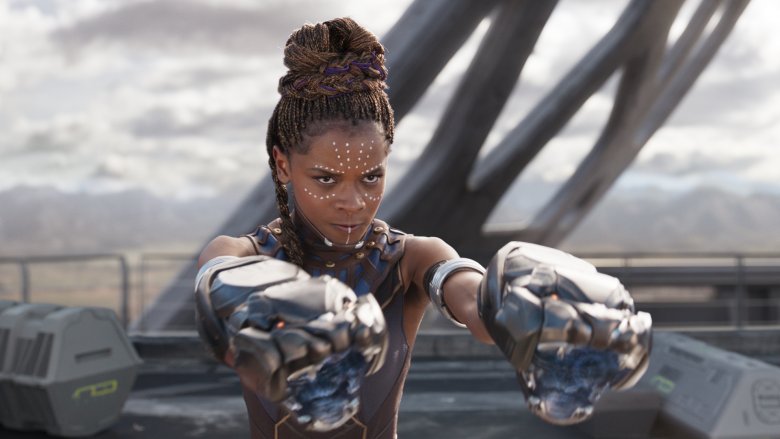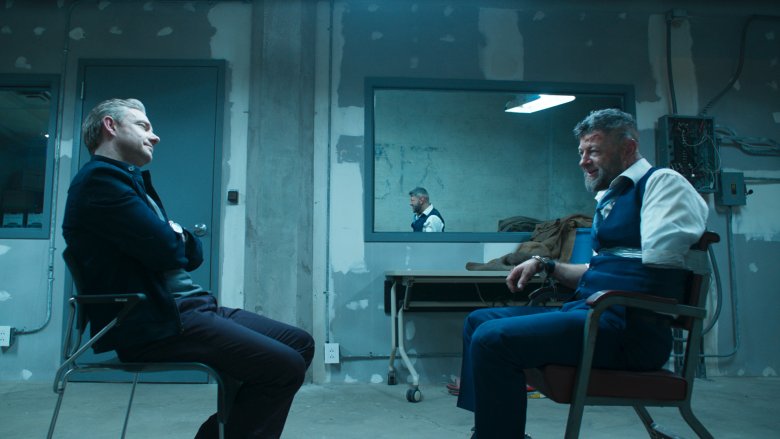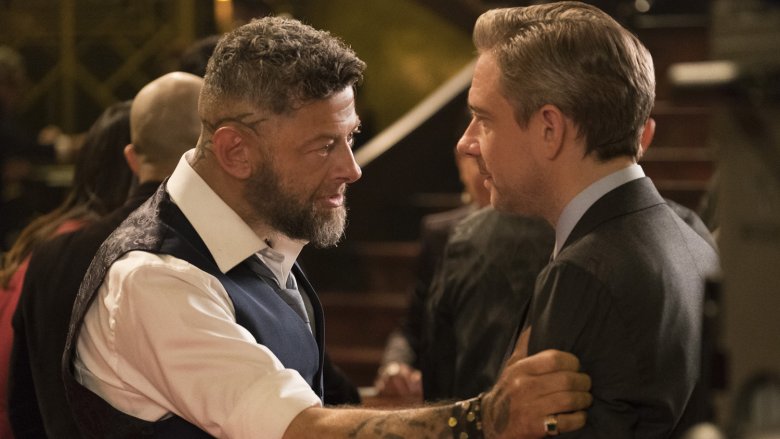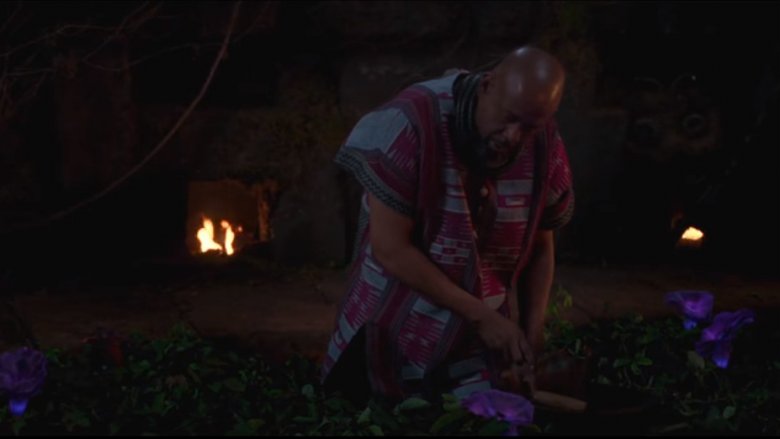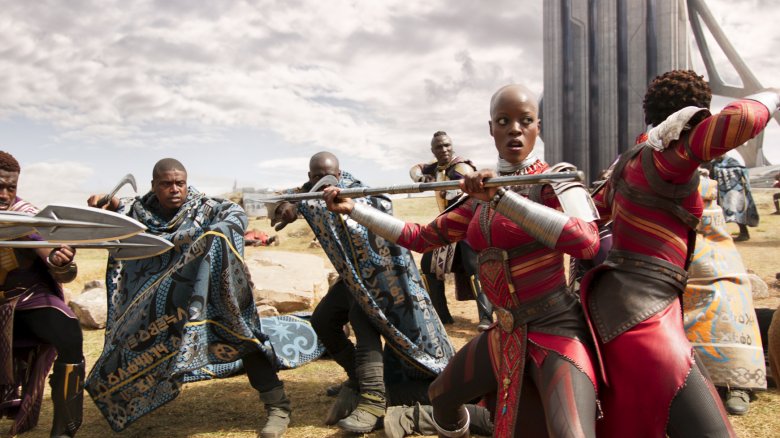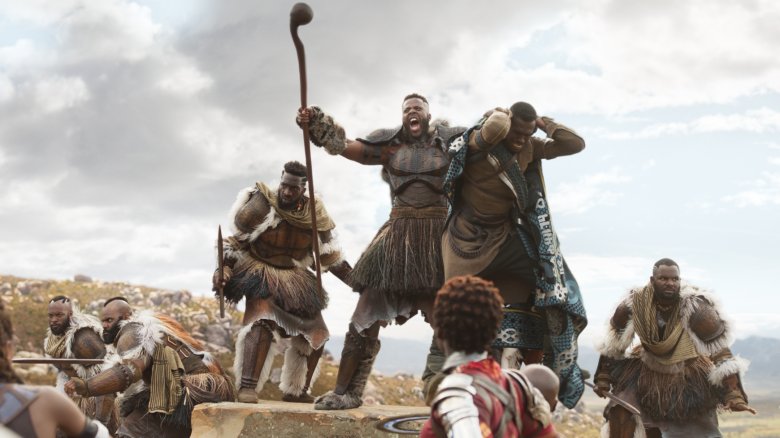Things Only Adults Notice In Black Panther
All of Marvel Studios' 19 (and counting) superhero films have proven popular on some level, but Black Panther is one of the few that crossed over from blockbuster to pop culture phenomenon. It was the kind of film that had moviegoers who'd never seen a Marvel film going back multiple times to celebrate its triumph, which means everyone from grandparents to five-year-olds who couldn't stop doing M'Baku impressions ended up seeing it.
That's great news for the franchise and for Marvel, but it also means that more than a few moviegoers came out scratching their heads over at least a couple of moments. The film introduces a whole new culture to the Marvel Cinematic Universe, and while there's still plenty of time to fill in Wakandan history and customs in future films, adults often came away with one impression, while kids came away with another. With that in mind, here are a few things adults likely noticed in Black Panther that all of those kids celebrating Wakanda may have missed.
The nature of Wakanda's wealth is very vague
Before any of the events of the film proper, we are given a sort of fairy tale version of the history of Wakanda, how the tribes came together, how the first Black Panther came to be, and why Wakanda remains an isolationist nation to protect itself from the chaos of the outside world. A news report tells us how the rest of the world views Wakanda: as "one of the poor countries" on Earth that "does not engage in international trade or accept aid." This is, of course, a front to hide Wakanda's wealth and massive stores of vibranium, but the film never elaborates on how everything else works.
Yes, vibranium is very powerful, useful stuff, but the Wakandans aren't out there selling it, and they're a small nation which can't possibly have every single resource imaginable within their borders. So what do they do when they need to buy something from another nation, and where do they get the money to buy it? Is it all done in secret? Has anyone ever traded with Wakanda and let slip what's really going on? Do they just buy everyone out? It's not that important to the plot, but "because vibranium" seems to be the only real explanation given.
Wakanda's isolationist policies are also rather murky
According to the film's intro, Wakanda closed itself off from the world so it could advance and grow in peace while World Wars and other chaos unfolded around it, but it's never made completely clear exactly how long this policy of complete isolation has been in place, or exactly how many gaps in it there are. In Captain America: Civil War, T'Challa's (Chadwick Boseman) father T'Chaka (John Kani) gives a speech in which he suggests Wakanda is about to step into the light after losing some citizens in a "goodwill mission" to Lagos, but then he's killed and T'Challa never seems to follow up on this. Plus, Wakanda sends various War Dog spies out into the world, including at least one who fell in love with an American woman. Then there's the vibranium artifact Killmonger (Michael B. Jordan) steals, which was found in Benin but made in Wakanda. Then there's Nakia, who seems to be allowed to go off on her own, fighting guerillas and freeing refugees as she pleases.
How does Wakanda decide who gets to go out into the world and who doesn't, and who remains secret and who gets to be public? Again, it's not too important to the main plot, but there are a lot of details left to explore here as T'Challa opens his nation to the world.
Did anyone ever check on young Killmonger?
Midway through the film, Zuri (Forest Whitaker) explains to T'Challa the origin of Killmonger: he's really N'Jadaka, son of Prince N'Jobu (Sterling K. Brown), and T'Challa's cousin. N'Jobu was a Wakandan spy in America who became "radicalized" after seeing the treatment of African Americans, and helped Klaue (Andy Serkis) steal vibranium with the hope of arming the masses. When T'Chaka found out, an alteraction ensued, and he was forced to kill N'Jobu.
According to Zuri, they knew N'Jobu had a half-American son, but they left him in Oakland to "maintain the lie" that N'Jobu had simply disappeared. It turns out the child had already absorbed many of his father's ideas, and that combined with his anger turned him into Killmonger. That was perhaps unavoidable on some level, but with all the spies under Wakanda's command, it's a little strange that no one kept tabs on Killmonger as he grew into a young genius with a prodigious talent for killing and a huge chip on his shoulder. It isn't until T'Challa sees Killmonger wearing his grandfather's ring that he begins to piece it together, when it could have easily been something Wakandan intelligence, or at least T'Chaka himself, was watching for.
Vibranium can basically do anything
The introduction of vibranium to the Marvel Cinematic Universe comes in Captain America: The First Avenger, when Steve Rogers (Chris Evans) gets his trademark shield and is told it's the hardest and rarest metal on Earth, so rare that the amount used to make the shield is all the Americans have. Black Panther shows us that vibranium isn't all that rare, as long as you live in Wakanda.
The country rests on a mountain full of it, and the Wakandans keep it secret from the rest of the world while also using it to advance their civilization and construct extremely powerful weapons. It's not just a hard metal that can be made into shields or spears. It also helps form the nanites that make Black Panther's suit, it's sewn into Wakandan clothes, it powers their transportation, and a host of other things. It's hard to tell from this film exactly what vibranium can't do or what, if anything, it's vulnerable to (apparently magnetic levitation is one thing). Can it be shaped into anything? Is it also a power source? None of this is ever made clear.
It's not a big deal in Black Panther, but it may come up later on in the MCU, because someone somewhere has to be able to at least try to harm T'Challa when he's in that suit. Right?
Klaue somehow knows more about Wakanda than the CIA
Early in the film, we see a scene from Oakland in 1992, in which T'Chaka describes Ulysses Klaue's vibranium theft and attack on Wakanda. This happens because N'Jobu played inside man to Klaue, and pointed him in the direction of the vibranium. Then, in the present day, after the vents of Avengers: Age of Ultron (in which Ultron gets his hands on Klaue's vibranium) and everything else that's transpired, Klaue explains the secrets of Wakanda to the CIA's Everett Ross (Martin Freeman), who seems genuinely shocked that Wakanda is not just the third-world country it's always claimed to be.
Now, Wakanda has obviously worked for a very long time to keep its secrets, but we also know that it has spies around the world, and that at least one of those spies (N'Jobu) once conspired with a very prominent and very brash South African arms dealer (Klaue) many years ago. Over the years, there must have been other such dealings. It seems a little strange that the CIA never noticed that anything at all was up, even if they weren't aware of just how powerful Wakanda really was.
There's probably still some loose vibranium in the world
In 1992, T'Chaka tells N'Jobu that Klaue made off with a "quarter ton" of vibranium in his Wakandan heist. Nearly three decades later, during the events of Black Panther, Klaue is still operating as an arms dealer, and has a vibranium mining cannon where his arm used to be, plus the ability to track down vibranium artifacts like that one he stole with Killmonger's help. We know Klaue sold a large stock of vibranium to Ultron to Avengers: Age of Ultron, much of which went into the making of Vision.
He's been a thorn in the side of the Wakandan government for decades, and it seems like he's never slowed down his business. It's never explicitly stated in the film, but based on everything we know about Klaue and his business dealings, it's hard to imagine there aren't still other pieces of vibranium out there somewhere, whether they're in stashes no one will ever find or in the hands of Klaue's clients. A lot of it may have gone to a single buyer and the Wakandans may have even recovered some of it, but Klaue was good at his job, and that suggests more rogue vibranium is out there.
Everyone exploits vibranium, but no one goes after the heart-shaped herb
Much of the plot of Black Panther revolves around vibranium and its significance to both Wakanda as a wealthy isolated nation and to outsiders as a valuable and potentially deadly commodity. It's a powerful metal with seemingly endless uses, and Killmonger's plan in the film largely revolves around getting vibranium weapons in the hands of Wakandan operatives around the world so they can overthrow various governments.
Vibranium isn't the only extremely powerful resource the Wakandans have, though. They also have the heart-shaped herb, a purple plant that, when consumed, grants the Black Panther his superhuman strength, speed, and durability. Both T'Challa and Killmonger drink the herb during the film, and Killmonger even goes so far as to burn the garden containing the spare plants in an effort to destabilize Wakandan tradition.
Now, it's possible the herb is just a more closely guarded, harder to cultivate secret, but it also feels like a key part of Wakandan tradition that most people — at least in the ruling class — would know about. With that in mind, why does no one ever try to exploit the plant that gives you superpowers for personal gain? Killmonger could have potentially made a diluted version of it and given out as a kind of super soldier serum to his operatives, but instead he destroyed it. It's not as plentiful as vibranium, but it still feels like a tough thing to simply pass over.
There are probably still rogue Wakandans out there
Though the fight for the throne takes place in Wakanda itself, Killmonger's plan is a global one, and relies heavily on the Wakandan spies known as "War Dogs" to carry it out. By sending vibranium weapons to various spies around the world, he hopes to begin arming resistance groups and overthrowing governments in the name of Wakanda. Near the end of the film, Killmonger's new ally W'Kabi (Daniel Kaluuya) informs him that though there is "some resistance" to the plan, War Dogs in New York, London, and Hong Kong are ready to receive their supplies.
Of course, then T'Challa shows up and overthrows Killmonger, restoring his rule of the kingdom and ending the weapons mission, so all seems to be well. Naturally, most of the War Dogs who had planned to follow Killmonger likely would've backed down upon learning T'Challa had killed him, and returned to their normal duties. Given human nature, though, and the rebellion of N'Jobu way back in 1992, it seems more likely that at least a few War Dogs would've remained loyal to Killmonger's ideals, which means there are likely still some rebels out there for the kingdom to deal with in the future.
For 'vegetarians,' the Jabari seem very cool with wearing fur and leather
One of the biggest laughs in the film comes when Ross, Nakia (Lupita Nyong'o), Shuri (Letitia Wright), and Ramonda (Angela Bassett) go to the home of the Jabari tribe in the mountains to ask their leader, M'Baku (Winston Duke), for help in the fight against Killmonger. As Ross attempts to explain the situation, M'Baku berates him, and tells him if he speaks again he will "feed you to my children." After a pause to let this soak in, M'Baku says "I'm just kidding, we are vegetarians," and then chuckles to himself along with the audience.
It's a great moment, but it's a little inconsistent with the rest of the Jabari culture as we see it in the film. A self-sustaining people, they're surrounded by wooden structures and seem to very much live off the land, as evidenced by their leather and fur clothes. If that's the case, taking the pelts and leaving the meat seems like a waste, unless the meat goes to feed various carnivorous pets.
